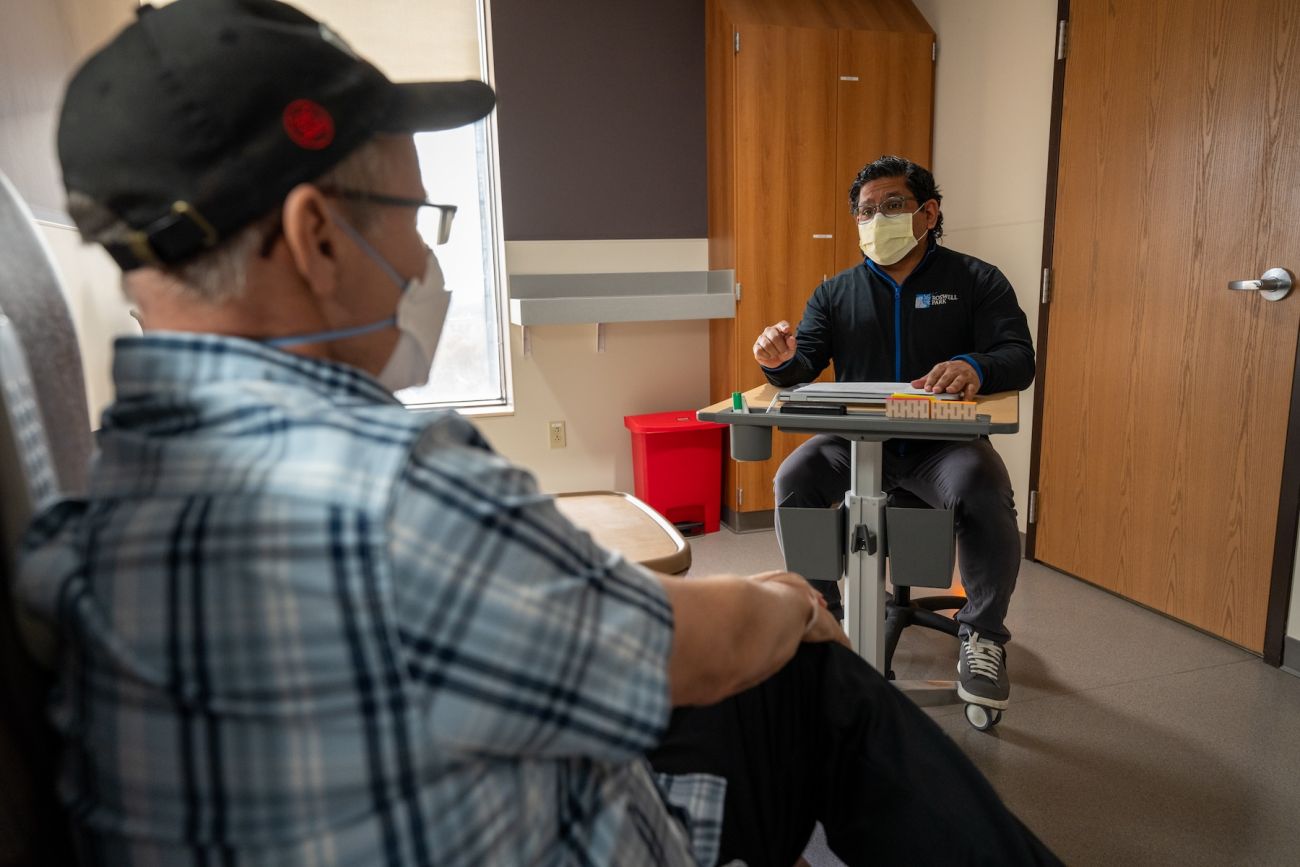Roswell Park offers transplant to patients with virtually no age restriction and has transplanted patients from age two months to 85 years.
A transplant of stem cells or bone marrow is a complex treatment used for some types of cancer and blood disorders. Today, this procedure (formerly called bone marrow transplant or BMT), most commonly uses stem cells collected from blood circulating in the bloodstream rather than from the bone marrow. Stem cells are collected in a process similar to donating blood, and it’s easier on a donor than extracting the cells from bone marrow.
How a transplant works
Will you need a transplant?
The ideal time for a consultation with a transplant specialist is when you’re first diagnosed with cancer. Meeting with a transplant specialist now is critical — even if you are in remission or don’t eventually need a transplant.
All your blood cells — red blood cells, white blood cells and platelets — start out as immature hematopoietic stem cells, which are produced in your bone marrow. When these stem cells mature, they transform into various types of blood cells, depending on what your body needs at the time. (Hematopoietic means blood-forming.)
With blood cancers such as leukemia, lymphoma and multiple myeloma, and certain blood disorders, something has gone wrong with your bone marrow or how your blood cells are made. Or your stem cells have been destroyed by high dose chemotherapy and/or radiation treatments that were used to eradicate your disease, leaving your body unable to produce the blood cells it needs.
A transplant gives you a fresh batch of stem cells that settle into your bone marrow so that your body can begin to produce healthy new blood cells.
The stem cells that are transferred to you may be collected from:
- blood that circulates through the bloodstream, called peripheral stem cells
- bone marrow tissue
- umbilical cord blood
You will receive these cells through an intravenous (IV) infusion, much like receiving chemotherapy or blood products.
Types of transplant — allogeneic vs. autologous
The type of transplant you need will depend on several factors, including your diagnosis, your general health and availability of a donor. The two basic types of transplant include:
- Allogeneic transplant means that a donor supplies the healthy stem cells. Our team will search for the best donor for you.
- Autologous transplant uses your own stem cells, usually collected before you begin other cancer treatments.
Roswell Park customizes the transplant process for each patient, based on their unique needs, including:
- Using related or unrelated donors
- Reduced intensity or non-myeloablative conditioning, allowing older patients to benefit from transplant
Conditions we treat with bone marrow or stem cell transplant
Pediatric patients
Transplant may be used to treat additional cancer types and conditions in pediatric patients.
- Acute lymphoblastic leukemia (ALL)
- Acute myeloid leukemia (AML)
- Aplastic anemia
- Chronic lymphocytic leukemia (CLL)
- Chronic myelogenous leukemia (CML)
- Non-Hodgkin lymphoma
- Hodgkin lymphoma
- Multiple myeloma
- Myelodysplastic syndrome
- Myeloproliferative neoplasms (MPNs)
- Selected malignant solid tumors, such as testicular cancer
A Center of Excellence — our Transplant & Cellular Therapy Center
A stem cell or bone marrow transplant is an aggressive and complex procedure that requires the expertise of oncologists who specialize in delivering transplant treatments and preventing and managing side effects, as well as other health professionals. At Roswell Park, our patients are treated in a state-of-the-art center by nationally recognized leaders in the field and using the latest strategies for optimal outcomes.
